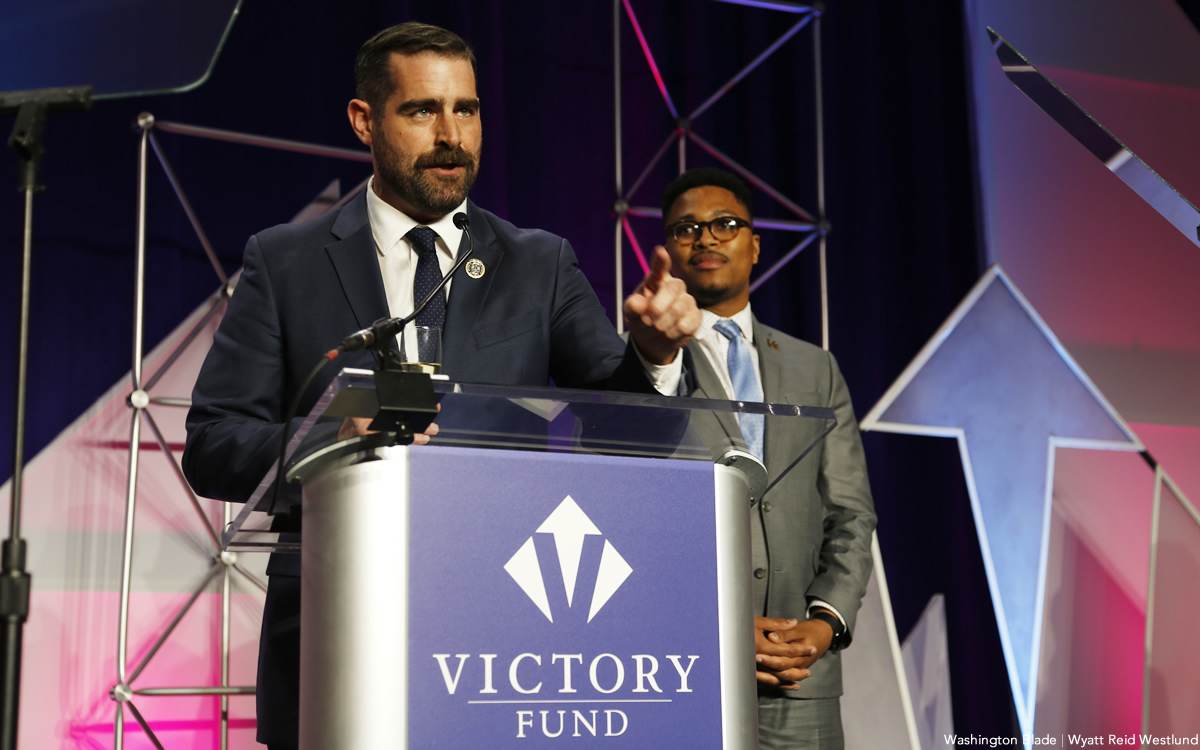Pennsylvania
In rebuke to Brian Sims, Pa. LGBTQ leaders back his straight opponent
Critics say lieutenant guv candidate has alienated colleagues

More than 40 LGBTQ leaders from across the state of Pennsylvania announced at a press conference on March 3 that they are endorsing one of two opponents of gay Pennsylvania State Rep. Brian Sims for lieutenant governor in the state’s May 17 Democratic primary.
The LGBTQ leaders, who held their press conference at Philadelphia’s William Way LGBT Community Center, said they were backing State Rep. Austin Davis in the lieutenant governor’s race on grounds that he is a strong and committed supporter of LGBTQ rights and has the best chance of winning in the general election in November. The move is a stunning rebuke to Sims, who has previously been endorsed by national LGBTQ groups, including the Human Rights Campaign and the LGBTQ Victory Fund.
Davis is a first-term legislator from Western Pennsylvania and, according to the Philadelphia Inquirer, is relatively unknown outside of his part of the state. If elected, he would become the state’s first African-American lieutenant governor.
The LGBTQ leaders also announced their endorsement of Pennsylvania Attorney General Josh Shapiro in his race for Pennsylvania governor in the Democratic primary. Shapiro announced earlier this year that he has endorsed Davis for lieutenant governor and considers Davis as his running mate in the May primary.
Both Davis and Shapiro, who is running unopposed for governor in the Democratic primary, attended the March 3 press conference. The two pledged to aggressively push for passage of a state LGBTQ rights bill and other LGBTQ supportive legislation in the Pennsylvania General Assembly.
“I am humbled and grateful to have the support of so many leaders from LGBTQ+ communities from all across our commonwealth – and I am ready to continue fighting for them as Pennsylvania’s next lieutenant governor,” Davis said at the press conference. “Every Pennsylvanian’s rights should be protected under the law, and in Harrisburg, I have worked to protect LGBTQ+ rights and advance equality,” he said.
Among the LGBTQ leaders who either spoke at the press conference or indicated their support of Davis for lieutenant governor and Shapiro for governor were Abington Township Commissioner Lori Schreiber; former Philadelphia Human Relations Commission Executive Director Rue Landau; and Schuylkill County Stonewall Democrats founder Maria Sanelli. Milford Borough Mayor Sean Strub, who did not attend the press conference, is among the LGBTQ leaders who have endorsed the Shapiro-Davis ticket. Transgender activist and former Erie County School Board President Tyler Titus spoke and endorsed Shapiro. Titus, in a later email to the Blade, clarified that they endorsed Sims for lieutenant governor.
The decision by the LGBTQ leaders to back Davis over Sims — who became the second openly LGBTQ person to serve in the Pennsylvania General Assembly — will likely come as a surprise to LGBTQ activists outside of Pennsylvania, many of whom have supported Sims for re-election to his state House of Representatives seat representing Center City Philadelphia.
None of the LGBTQ leaders who spoke at the press conference in support of Davis said anything about why they thought Sims would not also be a strong supporter of LGBTQ rights as lieutenant governor.
The Philadelphia Gay News, whose publisher, Mark Segal, expressed strong support for Davis at the March 3 press conference, has published reports and opinion columns by local activists claiming Sims has an abrasive personality that has alienated fellow lawmakers and some in the LGBTQ community.
One commentator in the Philadelphia Gay News said Sims is known for traveling across the country as a public speaker and reportedly has fallen short in constituent services work in his district. The same commentator wrote that none of Sims’s legislative proposals have passed in the General Assembly during his decade in office.
Sims and his supporters have disputed these claims, saying they often come from those who disagree with him on specific issues before the legislature.
The LGBTQ Victory Fund, a national organization that raises money to help elect LGBTQ candidates across the country, has endorsed Sims in the lieutenant governor’s race.
“The LGBTQ community is not a monolith,” said Victory Fund spokesperson Elliot Imse. “We have varied priorities, interests and political beliefs, so it is unsurprising a handful of LGBTQ community leaders would support other candidates,” Imse told the Blade.
“Yet the majority of LGBTQ voters and community leaders are excited to elect Brian Sims as the next Lieutenant Governor of the Keystone State, and his fundraising numbers are all the evidence you need,” Imse said. “Pennsylvanians’ enthusiasm behind Brian’s historic candidacy is resounding.”
In response to a request for comment, Sims sent the Blade a statement responding to the LGBTQ leaders’ decision to endorse Davis rather than him in the lieutenant governor’s race.
“Fighting for LGBTQ+ equality has been the work of my life,” Sims said in his statement. “You don’t have to look further than the legislation I’ve introduced and sponsored over the last decade or my career prior to office to see that,” he said.
“Our community – like many other communities – is tired of being approached by allies for our votes only around election time when it’s most convenient,” he said. “We’re more than a set of photo opportunities and press conferences, and we deserve representation that will actually fight for our causes. We need elected officials who’ve stood with the community before the campaign season, and will still be here after election day,” he said. “That’s why I’m running for Lieutenant Governor.”
Pennsylvania
White House freezes $175 million in funding for UPenn over trans athletes
Decision centers on decision to ‘allow’ Lia Thomas to compete on women’s swim team

The University of Pennsylvania learned Wednesday from Fox News and social media that the Trump-Vance administration is pausing $175 million in federal funding because of its nondiscrimination policy that allows transgender student athletes to compete as their authentic selves.
A reporter from Fox Business was first to break the news, describing the decision as a “pro-active punishment” for UPenn’s policy which she said violated Trump’s executive order, signed last month, banning “men from competing in women’s sports.”
BREAKING: The Trump Administration has “paused $175 million in federal funding from the University of Pennsylvania” over its policies forcing women to compete with men in sports.
Promises made, promises kept. pic.twitter.com/o4yiiqtH9d
— Rapid Response 47 (@RapidResponse47) March 19, 2025
The reporter went on to say an ongoing Title IX investigation puts the university “at risk of losing all its federal funding” because Lia Thomas, a former UPenn student athlete, made history three years ago this week by competing with other women.
That investigation, according to Fox, centers on the school’s decision to “allow transgender and biological male Lia Thomas to compete on the women’s swim team, use women’s locker rooms while exposing his male genitalia to his fellow female athletes.”
A spokesperson for the university told Fox it had not received any “official notification” of the decision on funding by the Trump administration. UPenn said the university was and is in “full compliance” with NCAA and Ivy League policies:
“We are aware of media reports suggesting a suspension of $175 million in federal funding to Penn, but have not yet received any official notification or any details. It is important to note, however, that Penn has always followed NCAA and Ivy League policies regarding student participation on athletic teams. We have been in the past, and remain today, in full compliance with the regulations that apply to not only Penn, but all of our NCAA and Ivy League peer institutions.”
As the Washington Blade reported on March 17, 2022, Thomas was a UPenn senior when she became the NCAA’s first openly trans Division 1 national champion at the Women’s Swimming and Diving Championship held in Atlanta that day. She won the 500-yard freestyle with a time of 4:33:24, one second faster than her closest competitor.
Thomas graduated in 2022 and started her pursuit of a law degree and the chance to compete in last summer’s Olympic Games in Paris. The Court of Arbitration for Sport upheld a worldwide ban on trans women athletes in June 2024, ending her dream of swimming at the Olympics or any other women’s competition, as the Blade reported.
Thomas did not respond to a request for comment Wednesday evening. Last summer, the aspiring attorney commented on the decision that smashed her hopes of competing again.
“Blanket bans preventing trans women from competing are discriminatory and deprive us of valuable athletic opportunities that are central to our identities,” said Thomas.
Openly trans athlete and activist Chris Mosier noted in a video posted on Instagram that Thomas and the university were in total compliance with rules of that time, and that the funding is being frozen despite the fact Trump was not even in office when Thomas competed.
View this post on Instagram
Also speaking out Wednesday was Riley Gaines, who tied with Thomas for fifth place at the 2022 championships and has gone to become a paid spokesperson for anti-inclusion women’s sports organizations.
“The Trump administration has yet again taken swift action to uphold common sense and preserve women’s opportunities by pausing $175 million in federal funding to the University of Pennsylvania,” Gaines told Fox News.
UPenn’s policy appears online, stating: “The Policy of Equal Opportunity, Affirmative Action and Nondiscrimination at the University of Pennsylvania states “the University of Pennsylvania prohibits unlawful discrimination based on race, color, sex, sexual orientation, gender identity, religion, creed, national or ethnic origin, citizenship status, age, disability, veteran status, or any other legally protected class.”
“The federal Title IX Policy extends to trans students; it states “No person in the United States shall, on the basis of sex, be excluded from participation in, be denied the benefits of, or be subjected to discrimination under any education program or activity receiving federal financial assistance.”
Pennsylvania
Transgender Honduran woman canvasses for Harris in Pa.
Monserrath Aleman is CASA in Action volunteer

A transgender woman from Honduras has traveled to Pennsylvania several times in recent weeks to campaign for Vice President Kamala Harris and other Democratic candidates.
Monserrath Aleman traveled to York on Aug. 31 and Lancaster on Sept. 21 with a group of other volunteers from CASA in Action.
They door-knocked in areas where large numbers of African Americans, Black, and Latino voters live. Aleman and the other CASA in Action volunteers urged them to support Harris, U.S. Sen. Bob Casey (D-Pa.), and other down ballot Democratic candidates.
Aleman will be in Harrisburg on Nov. 2, and in York on Election Day.
“We achieved the goal that we had in mind and that we wanted to achieve,” she told the Washington Blade on Oct. 22 during a Zoom interview from Baltimore. “We knocked on doors, passed out flyers.”
Aleman cited Project 2025 — which the Congressional Equality Caucus on Thursday sharply criticized — when she spoke with the Blade.
“We know that there is a Project 2025 plan that would affect us: The entire immigrant Latino community, the LGBTI community, everyone,” said Aleman. “So that’s why I’m more motivated to go knocking on doors, to ask for help, for support from everyone who can vote, who can exercise their vote.”
She told the Blade that she and her fellow volunteers “did not have any bad response.”
Aleman grew up in Yoro, a city that is roughly 130 miles north of the Honduran capital of Tegucigalpa.
She left Honduras on Nov. 25, 2021.
Aleman entered Mexico in Palenque, a city in the country’s Chiapas state that is close to the border with Guatemala. The Mexican government granted her a humanitarian visa that allowed her to legally travel through the country.
Aleman told the Blade she walked and took buses to Ciudad Juárez, a Mexican border city that is across the Rio Grande from El Paso, Texas.
She scheduled her appointment with U.S. Customs and Border Protection while living at a shelter in Ciudad Juárez. Aleman now lives in Baltimore.
“Discrimination against the LGBTI community exists everywhere, but in Honduras it is more critical,” said Aleman.
Aleman added she feels “more free to express herself, to speak with someone” in the U.S. She also said she remains optimistic that Harris will defeat former President Donald Trump on Election Day.
“There is no other option,” said Aleman.
Pennsylvania
Pa. House passes bill to repeal state’s same-sex marriage ban
Measure now goes to Republican-controlled state Senate

The Democratic-controlled Pennsylvania House of Representatives on July 2 passed a bill that would repeal the state’s same-sex marriage ban.
The marriage bill passed by a 133-68 vote margin, with all but one Democrat voting for it. Thirty-two Republicans backed the measure.
The bill’s next hurdle is to pass in the Republican-controlled Pennsylvania Senate.
State Rep. Malcolm Kenyatta (D-Philadelphia), a gay man who is running for state auditor, noted to the Pittsburgh Tribune-Review the bill would eliminate a clause in Pennsylvania’s marriage law that defines marriage as “between one man and one woman.” The measure would also change the legal definition of marriage in the state to “a civil contract between two individuals.”
Kenyatta did not return the Washington Blade’s requests for comment.
The U.S. Supreme Court in 2015 in Obergefell v. Hodges extended marriage rights to same-sex couples across the country.
Justice Clarence Thomas in the 2022 decision that struck down Roe v. Wade said the Supreme Court should reconsider the Obergefell decision and the Lawrence v. Texas ruling that said laws that criminalize consensual same-sex sexual relations are unconstitutional. President Joe Biden at the end of that year signed the Respect for Marriage Act, which requires the federal government and all U.S. states and territories to recognize same-sex and interracial marriages.
Republican Virginia Gov. Glenn Youngkin earlier this year signed a bill that codified marriage rights for same-sex couples in state law. Pennsylvania lawmakers say the marriage codification bill is necessary in case the Supreme Court overturns marriage rights for same-sex couples in their state and across the country.
-

 Movies2 days ago
Movies2 days agoSexy small town secrets surface in twisty French ‘Misericordia’
-

 Federal Government3 days ago
Federal Government3 days agoMass HHS layoffs include HIV/AIDS prevention, policy teams
-

 The White House1 day ago
The White House1 day agoUSCIS announces it now only recognizes ‘two biological sexes’
-

 Maryland4 days ago
Maryland4 days agoAt transgender visibility celebration, Moore called out for lack of action










